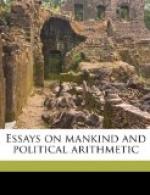3. I found that A.D. 1685, there were 29,325 hearths in Dublin, and 6,400 houses, and in London 388 thousand hearths, whereby there must have been at that rate 87,000 houses in London. Moreover I found that in Bristol there were in the same year 16,752 hearth; and 5,307 houses, and in London 388,000 hearths as aforesaid; at which rate there must have been 123,000 houses in London, and at a medium between Dublin and Bristol proportions 105,000 houses.
Lastly, by certificate from the hearth office, I find the houses within the bills of mortality to be 105,315.
Having thus found the houses, I proceed next to the number of families in them, and first I thought that if there were three or four families or kitchens in every house of Paris, there might be two families in one-tenth of the housing of London; unto which supposition, the common opinion of several friends doth concur with my own conjectures.
As to the number of heads in each family, I stick to Grant’s observation in page —– of his fifth edition, that in tradesmen of London’s families there be eight heads one with another, in families of higher ranks, above ten, and in the poorest near live, according to which proportions, I had upon another occasion pitched the medium of heads in all the families of England to be six and one-third, but quitting the fraction in this case, I agree with Monsieur Auzout for six.
To conclude, the houses of London being 105,315 and the addition of double families 10,531 more, in all 115,846; I multiplied the same by six, which produced 695,076 for the number of the people.
The Second Way.
I found that the years 1684 and 1685, being next each other, and both healthful, did wonderfully agree in their burials, viz., 1684 they were 23,202, and A.D. 1685 23,222, the medium whereof is 23,212; moreover that the christenings 1684 were 14,702, and those A.D. 1685 were 14,730, wherefore I multiplied the medium of burials 23,212 by 30, supposing that one dies out of 30 at London, which made the number of people 696,360 souls.
Now to prove that one dies out of 30 at London or thereabouts, I say -
1. That Grant in the —– page of his fifth edition, affirmeth from observation, that 3 died of 88 per annum which is near the same proportion.
2. I found that out of healthful places, and out of adult persons, there dies much fewer, as but one out of 50 among our parliament men, and that the kings of England having reigned 24 years one with another, probably lived above 30 years each.
3. Grant, page —– hath shown that but about one of 20 die per annum out of young children under 10 years old, and Monsieur Auzout thinks that but 1 of 40 die at Rome, out of the greater proportion of adult persons there, wherefore we still stick as a medium to the number 30.
4. In nine country parishes lying in several parts of England, I find that but one of 37 hath died per annum, or 311 out of 11,507, wherefore till I see another round number, grounded upon many observations, nearer than 30, I hope to have done pretty well in multiplying our burials by 30 to find the number of the people, the product being 696,360, and what we find by the families they are 695,076, as aforesaid.




